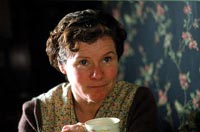Mike Leigh’s films garner awards all over the world. He coaches terrific, award-winning performances from his actors. And now he’s outdone himself with Vera Drake, the best film Leigh has made and one of the best films of this year. Imelda Stanton, in the title role, turns in the performance of a lifetime, and is already an early favorite to be an Oscar nominee.
Set in England in 1950, Vera Drake is the true story of a gentle, modest housewife and cleaning woman who performs abortions for “girls who have gotten in trouble.” Vera Drake is a proper, working-class woman of her time. She doesn’t use words like womb, pregnant or abortion. That would be vulgar and embarrassing.

Vera shows up at a pregnant girl’s apartment armed with the tools of her trade packed in a sensible handbag. She washes up and prepares her materials as though she is baking a nice pie for the family. She is kind and reassuring. She is discreet but not crafty. In her heart and in her mind she is simply helping. She wouldn’t dream of taking money.
Vera gets along with everybody. Her domestic jobs, combined with her husband Stan’s job at his brother’s garage, allow them to live a modest but comfortable life in a tiny flat. Their son, Sid, makes a living as a tailor’s apprentice, and their wallflower daughter, Ethel works in a light bulb factory. They are a wonderfully happy and functional family who genuinely love and appreciate one another. When one of them has a bit of good fortune it is a time for rejoicing.
The Drakes are the kind of family with the kind of quintessential English decency that George Orwell praised in his essay, “England, Your England.” They are polite and gracious. They dress humbly but are flawlessly groomed. They accept their roles in the English class system with dignity.

Director Leigh takes us into the automotive garage to see a friendly and supportive relationship between Stan and his brother, Frank. He takes us inside the wealthy homes where Vera toils happily, dusting and cleaning furniture she could never dream of owning. In a delightful vignette, we watch Sid measure an Irish laborer for a wedding suit. Sid is charming, professional and invigorated by his good fortune. Ethel’s job in the light bulb factory is monotonous and soul-killing, but she gives it her all. When Vera invites a lonely bachelor around for a decent meal, a gentle romance ensues with Ethel.
Leigh treats his characters with tenderness and respect. Their dreams are modest and they live contented lives. Vera visits a sick neighbor and her ailing mother, always ready to brew a nice pot of tea.
Vera Drake succeeds as a brilliant film in its portrayal of Vera’s activities as an extension of her Martha-like devotion to meeting the needs of others. It would be easy to make Vera Drake an apologia for either side of the raging abortion debates, but Leigh takes a different path. We see Vera visiting her skills upon a terrified rape victim and a haggard mother of seven. But just as we begin to see Vera’s work as a response to terror and violence, we meet a martini-sipping It-Girl who giddily cuts short Vera’s explanations by saying, “I’ve done this before.” We also meet the unfaithful wife of a navy man.

In contrast to the poor and working class girls Vera often encounters, we meet a rich girl who’ll have nothing to do with Vera. Susan is the daughter of a rich family for whom Vera cleans. As Vera dusts and scrubs, Susan is as unaware of Vera as is her snobbish mother. When Susan, who lives in her own form of denial, is raped by a boorish date, she becomes pregnant and lives in bewildered terror. She learns that an abortion will cost 500 pounds—a huge sum, equal to several thousand dollars today. A big chunk of that money first goes to a psychiatrist who agrees to sign off on her “instability” as a prerequisite for her doctor to perform a legal abortion. Susan is taken to a discrete, private clinic where she will receive the operation under the strictest protocols of antiseptic surgery. The doctor sees this farce for what it is, but goes along and performs the abortion.
Like the doctor, Vera also performs abortions (though she would not utter that word), but she exists in a world of denial that allows her to live without entering the moral debates. She never talks about her work. Her interactions with her girls are polite and pleasant, but also detached and perfunctory.
Unlike the doctor, Vera seems ignorant of modern asepsis. She is very clean and tidy, but her operations are far from sterile. Eventually, one of Vera’s girls becomes violently ill and is on death’s door before she is taken to the hospital. Here begins the true morality tale, but we’re unsure of what the moral is. Vera is horrified and humiliated, and we wonder if she has ever considered the weight of the law coming down upon her. Her only real concern is for her bewildered family.

Her husband and children are shocked, and wrestle with their love for this dear woman, and her secret activities that are so offensive to their beliefs. Sid is adamant: “How could you, mum? Those are little babies!” The preview screening of Vera Drake drew heavily from feminist and pro-choice communities, but there was no snickering or condescension as Sid vented his anger and hurt.
Some films succeed because of an incisive and compelling script, or brilliant performances. Others capture a mood or time so flawlessly that we forget we’re watching a movie. Still others give us a new way to look at difficult issues-including those issues on which we already have firm convictions. Vera Drake excels in all of these. It’s a seamless vision, executed by a master filmmaker. Like great literature, great film leaves us with more questions than answers. It challenges us, not so much in what we believe about right or wrong, but in how we believe in them.
Mike Leigh has given us a gift. In a hopelessly polarized debate, he allows us all to see real people involved in real situations. It is a film that will keep people on either side of the abortion debates talking. Perhaps they will even talk to one another.
Talk About It
Discussion starters
- In what ways have both sides of the abortion debates demonized one another? How does this demonization affect our ability to engage in productive, civil debate?
- Are there any cases where decent, moral people can engage in immoral activities? For example? Why or why not?
- Why is Vera able to do her work so cheerfully and be so devastated when her family finds out?
- Does the ending of the film seem to take a viewpoint on the abortion issue?
The Family Corner
For parents to consider
Vera Drake is rated R and contains several non-explicit abortion scenes and could be quite troubling for younger or very sensitive teenagers.
Photos © Copyright Fine Line Features
What Other Critics Are Saying
compiled by Jeffrey Overstreet
from Film Forum, 10/28/04
Would you be interested in a movie about an abortionist? Many will likely avoid Mike Leigh’s film Vera Drake when they hear about its subject matter. Perhaps they assume the film is merely a propaganda piece for defenders of abortion. If they knew that Christian film critics would come forward celebrating it as “one of the best films of this year,” perhaps they would give it a chance.
“Mike Leigh’s … outdone himself with Vera Drake,” says Stefan Ulstein (Christianity Today Movies). “[It’s] the best film Leigh has made and one of the best films of this year. Imelda Stanton … turns in the performance of a lifetime. Some films succeed because of an incisive and compelling script, or brilliant performances. Others capture a mood or time so flawlessly that we forget we’re watching a movie. Still others give us a new way to look at difficult issues—including those issues on which we already have firm convictions. Vera Drake excels in all of these. It’s a seamless vision, executed by a master filmmaker. In a hopelessly polarized debate, [Leigh] allows us all to see real people involved in real situations. It is a film that will keep people on either side of the abortion debates talking. Perhaps they will even talk to one another.”
Harry Forbes (Catholic News Service) praises Staunton, the cast, the screenplay, and the director. “Leigh is careful not to make any of the authority figures … villains. As this small, feisty, utterly ordinary woman, Staunton gives an indelible performance. Tremendous as she is … the entire cast is simply superb. As for the abortion theme, the procedure isn’t glorified in any way. The director leaves conclusions to the viewer, many of whom are likely to note that there is retribution on every level—personal and public—for Vera’s well-intentioned, if misguided, actions.”
Based on the reactions of mainstream film critics, it seems that those who skip Vera Drake will miss out on what may well be the year’s best performance by an actress: Imelda Staunton is winning raves for her turn as a naïve nurse dedicated to “helping young women” but blind to the damage caused by her endeavors.
Copyright © 2004 Christianity Today. Click for reprint information.











